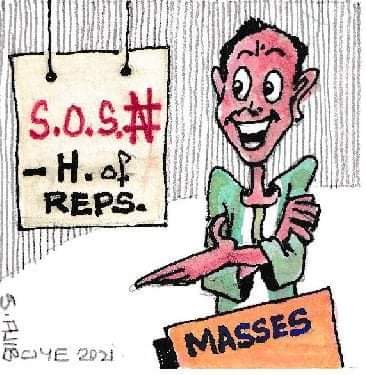Whether hoping to curry public sympathy or seeking to enlighten the public on the legislature’s state of affairs, House of Representatives spokesman, Banjamin Kalu, revealed last week that the country’s lower chamber was hard up, broke even, and in dire financial straits. Contractors could not be paid, he moaned, adding that the cash crunch in the country’s economy and the disheartening exchange rate of the naira had piled the agony on the house. In response, Nigerians had neither sympathy nor concern, but only scorn to give. A man who has lost his office pen does not expect to be taken seriously when he decides to complain to a farmer who has lost his harvest. It is not a practicable venture, but Mr Kalu undertook it nonetheless.
He revealed at a press briefing: “Yes, the House is broke. I have said it before and I am saying it again. I am not afraid to say it. The House is broke and it is afraid to appropriate sufficient amount needed for members to do their job… That is why the hearing rooms are not fixed. That is why the House is indebted to contractors who provide one form of service or the other… The budget of the National Assembly is supposed to be reviewed, in view of its purchasing ability, on the basis of the services that will help the parliament to move forward. At the moment, it is a weak budget, and this is the truth. I have actually fought with the leadership of the House and I have asked the question: ‘Why are you afraid to raise the budget of the National Assembly to enable us conduct our services efficiently and effectively?’ We appropriate for agencies to run effectively; yet, we are in penury to our own constitutional mandate. It is a disservice to Nigerians. The poor budget of the parliament is a disservice to Nigerians.”
Although many Nigerians think that the current House of Reps has been more proactive than the Senate in checking the executive arm of government, they are still not satisfied that they enjoy appropriate representation in the national legislature. Hon Kalu’s enthusiasm for increased budgetary provisions will also not be shared by Nigerians who have sneered at the House of Reps’ predicament. The immediate reaction that trailed Hon Kalu’s revelations was that the House, and not the representatives currently in office, was what had come to such a sorry pass as to be in debt and disrepair. No harm done then, they conclude. Public analysts advise that if the representatives would simply cut down on their hefty personal remunerations and allowances, then they would find the funds to pay off their bills. Everyone has bills to pay, and even those with a leaner budget than the House of Reps are paying theirs. Clothes must be cut according to the cloth. But even on the issue of the lawmakers’ remunerations and allowances, there is some dispute.
Simon Karu, member of the House of Reps, noted last October that, “…the official salary of a member, House of Representatives, which I also receive monthly, is N800,000. The office running cost of a member of the House of Representatives is N8.5 million.” This amounts to about N9.3m monthly. Another member, Nicholas Ossai, denied this claim, stating that he had never received such funds since he became a member of the house. He has been a federal lawmaker at the House of Reps since 2011. As at 2017, it was revealed that each representative cost taxpayers N169.6m to maintain annually, amounting to N14.1m monthly. It is therefore not clear why he said he had never collected that amount of money. This sum is, nevertheless, significantly higher than other more recent reports which put the monthly basic salary of each representative, including allowances, at N794,000. Non-regular allowances, such as furniture allowance, vehicle loan allowance, leave allowance and others, have not been factored into this lesser calculation since they are by nature non-regular. Transparency of lawmakers’ salaries and allowances has remained a sore point in Nigerian democracy.
Seeing therefore that their salaries and allowances are intact (and some will argue too much so), Nigerians are determined that the lawmakers can continue to bemoan lack of funds all they want, but they will not believe them. One of the criticisms of the Nigerian federal structure is the cost of governance. It will cost the country about N125b to maintain the legislature comprising some 469 elected individuals. Duplication of offices, especially between the Senate and House of Reps, continues to irk Nigerians and try them highly, so they will not agree that the House of Reps’ budgetary constraint is any disservice to them. Some even wonder why the National Assembly should receive any funds, whether N200m or less as reports say, to execute projects in their constituencies.
The disregard and contempt for the House of Reps’ financial incapacitation is simply a consequence of the overall economic atmosphere in the country. A country that has over 105 million people living in extreme poverty is not likely to sympathise with its House of Reps because it cannot afford to service its burdensome running costs. The National Assembly in its entirety should have been alive to the regressive and perambulating policies espoused by the executive arm, which contributed alongside other factors to the impoverishment of Nigeria. For now though, the House of Reps will attract no sympathy.
House of Reps Broke? ▪By Paul Ade-Adeleye


